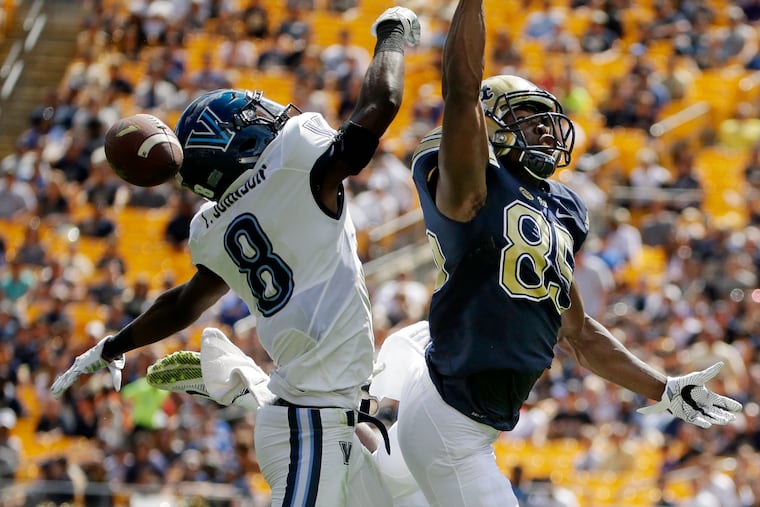Opposing athletes’ wages in a Philly federal courtroom, NCAA endures tough day
A three-judge panel listened to arguments about whether college athletes are to be considered employees under the Fair Labor Standards Act, and asked a lot of pointed questions.

Wednesday afternoon’s hearing on the 19th floor of the U.S. Federal Courthouse at Sixth and Market was a seemingly minor step in RALPH “TREY” JOHNSON, Plaintiff, v. NATIONAL COLLEGIATE ATHLETIC ASSOCIATION, et al, Defendants.
Walking in, maybe you expected nothing but dry legalese as a three-judge panel on the U.S. Court of Appeals for the Third Circuit listened to arguments about whether college athletes are to be considered employees under the Fair Labor Standards Act.
The judges weren’t deciding the merits of the case, just whether it should move toward a discovery phase.
» READ MORE: A class-action lawsuit brought by a former Villanova football could change college sports
“I better come straight to it,” said Steven Katz, given 15 minutes, arguing on behalf of the colleges, outlining “a minefield of unforeseen consequences” if federal policy is changed to mandate a minimum wage for Division I athletes, as the plaintiffs are requesting.
Judge Theodore McKee cut Katz off pretty quickly: “What’s legal and what’s practical here” isn’t the same thing at all, the judge suggested.
This was not going to be boring. These judges were not working on a timer.
The judges came at the case from different angles, with different questions. You’d expect that from judges appointed by Presidents Clinton, Obama and Trump. They were all versed in the case and the college sports landscape – a landscape on trial, across the land.
U.S. Eastern District Court Judge John Padova, based in Philadelphia, already had decided that this case, with a former Villanova football player as lead plaintiff, can proceed on the issue of whether Division I sports is there primarily for the athletes or the monetary benefit of the school, and also whether sports provides educational opportunities or interferes with them. This was an appeal hearing.
To be clear: The 2021 unanimous Supreme Court Alston decision has changed this whole game. In declaring that the NCAA can’t limit education-related benefits like computers and paid internships that colleges can offer athletes, Justice Brett Kavanaugh wrote: “Nowhere else in America can businesses get away with agreeing not to pay their workers a fair market rate on the theory that their product is defined by not paying their workers a fair market rate.”
» READ MORE: The Supreme Court isn't buying what the NCAA is selling
There were more such thoughts thrown around at Sixth and Market. One point involved walk-ons in scholarship programs. They didn’t expect compensation. Yes, but why was that? Because there was no hope of compensation.
“Let’s assume we live in a fantasy world,” McKee said at one point. “March Madness was called March Waste of Time.”
He was saying, what if nobody watched? The judge joked about missing the Rose Bowl contested by Binghamton vs. Algonquin High. In other words, a lot of money is being made within this system. McKee made the point that this is not a true free-market system, so economic arguments fall short.
There was talk of class schedules, how certain majors are difficult to attain because mandatory practice times get in the way.
“How are they not employees?” McKee asked, after already batting aside the potential Title IX implications by asking if there aren’t already discrepancies such as the different weight facilities at last season’s NCAA men’s and women’s basketball tournaments.
Luis Felipe Restrepo, the judge leading the panel, looking at the issue of control, also asked how athletes were not employees. A different interesting question: Were these athletes playing or working? Maybe both? Judge David Porter, who also asked a lot of questions on amateurism and scholarships, maybe signaled his own thoughts later in the hearing when he suggested the facts of this case could not be determined by the facts at hand.
Afterward, Willemin said he “didn’t give any credence” to claims by the NCAA that there would be “some sort of massive fallout” from having to pay athletes’ minimum wage. Attorneys for the plaintiffs argue that even if some of these sports are losing enterprises, that plenty of companies don’t turn a profit but still must pay their employees.
Maybe the counsels making the arguments best indicated which side was playing offense and which was on defense right after the hearing when the lead attorney for the colleges declined comment and the lead attorney for the plaintiffs stood in the hallway and answered any questions posed.
On the subject of whether scholarships might be reduced if schools were forced to also pay minimum wage, Willemin argued in the courtroom that if this current NCAA system “tumbles down, it’s not our job to keep it up if it’s not legal.”
An argument, not a verdict. The official verdict on the appeal probably won’t be issued for several months. How a full trial on the merits of this case ultimately would play out is a great unknown. But if you’re scoring at home, or you were inside this courtroom on Market Street, the NCAA got knocked out, again.